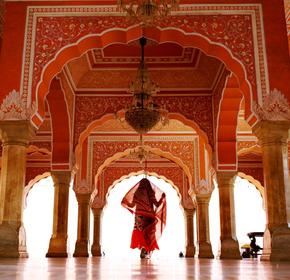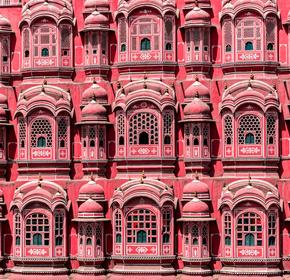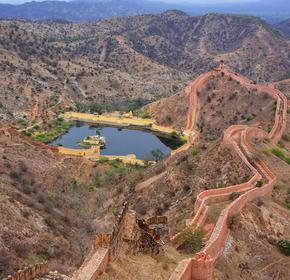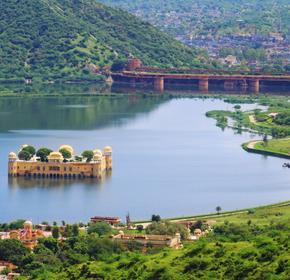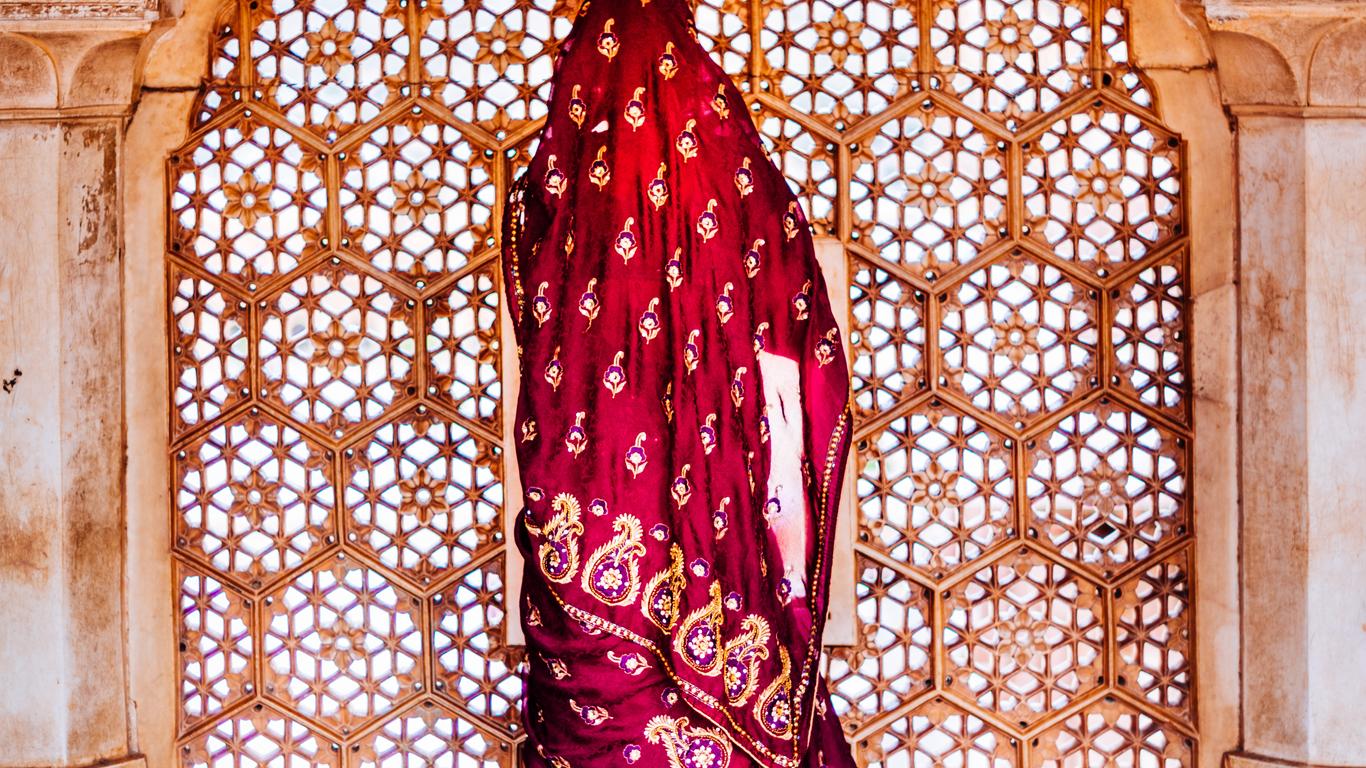
Jaipur travel guide
Jaipur Tourism | Jaipur Guide
You're Going to Love Jaipur
Centuries-old royal palaces and the sheer energy of modern India combine in Jaipur to create something genuinely special. This northern Indian jewel is the ideal way to discover the magic of the subcontinent.
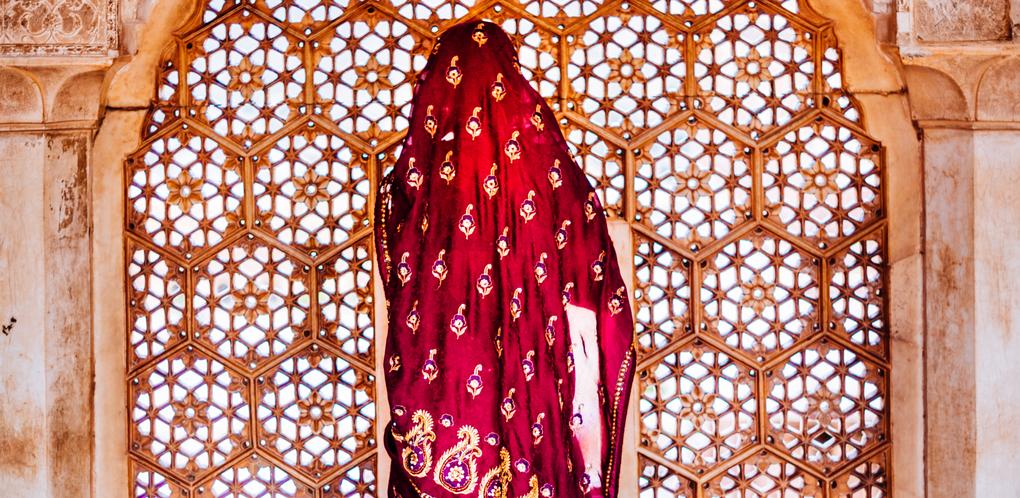
Aside from anything else, Jaipur is a stunning historical attraction, with the majesty of the Amer Fort, the stunning City Palace, and the Hawa Mahal, with its complex, beautiful facade. But modern Jaipur has undeniable appeal as well. Take a Jaipur Food Tour to explore the fiery cuisine of Rajasthan, mingle with the spice sellers and elephants in the bazaar, visit the city's famous gem merchants, and pick up unique craft products like a comforting rajai blanket.
With fascinating history, visually stunning architecture and activities, restaurants and shops to explore, Jaipur delivers on every level. It's a fabulous destination.
Top 5 Reasons to Visit Jaipur
1. Thousands of Years of Glorious History
From the dazzling Amer Fort with its snake-like staircase and Hindu decorations to the ornate facade of the Hawa Mahal and the sprawling courtyards and gardens of the City Palace, Jaipur's pre-colonial past is a magnificent spectacle.
2. Thriving Bazaars and Craft Marketplaces
The bazaar remains the heart of Jaipur's economy, and the city is dotted with these dynamic, sometimes chaotic markets. You'll find tables laden with jewels at Johari bazaar (also called Johari Bazar), textiles at Tripolia, and bright colors and illuminations at the centrally located Nehru. Haggle as much as you like, and take home a vacation bargain or two.
3. Some of the Finest Food Anywhere in India
Rajasthan's cuisine is revered in India, and there is no better destination for vegetarians. The state is 70 percent vegetarian, and the city is crammed with places to discover new veggie dishes. Don't miss Kachori (spicy onion pastries) and Mirchi Bada (chili and potato starters).
4. Stunning Textiles Made by Local Artisans
Jaipur is a legendary textile producing city, with local artisans specializing in block printed fabrics and cozy rajai blankets. You don't need to just purchase these exquisite products; you can also head to Sanganer to see textile prints being made - an unforgettable experience for fashion fans.
5. Tiger Watching and Elephant Sanctuaries in the Nearby Area
Rajasthan is a great destination for nature lovers. You can head to the well-managed tiger reserve in Ranthambore National Park, enjoy elephant rides at sanctuaries like Eleday, and get close to the city's famously sociable population of macaque monkeys.
What to do in Jaipur
1. Amer Fort: A Rajasthani Gem
Just outside Jaipur, this epic 16th-century fortress perches upon a hilltop. The sprawling palace seems to never end, arranged as it is on four levels with an opulent courtyard on each. Also known as the Amer Fort, its walls glow pink in the sun, a shimmering sight beckoning visitors nearer. A closer look is even more awe-inspiring, with high-quality mosaics and lavish designs taking over the interior. The Mirror Palace is the most beautiful, featuring carved walls and ceilings of pure glass.
2. City Palace: The Pink City
There is nothing quite like vast City Palace - its pastel buildings boast the greatest constellation of cultural styles around, from Mughal to European. More and more majestic homes were added over the centuries so that today visitors step from one era into the next as they let their imaginations run wild. Ogle the royal textiles worn by kings and queens, and take in the display of weaponry from swords to axes. Surprises await around every corner, so explore your heart out.
3. Hawa Mahal: Palace of Winds
This design of the gleaming pink palace is based on the complex crown of Lord Krishna, and its detail is overwhelmingly beautiful. Hundreds of windows make up the facade of the ancient structure, extending skywards in five tiers of ornate perfection. Wives of kings used to look out upon processions below, hidden from the ordinary folk - a division you can experience for yourself today from both perspectives. Every inch is awe-inspiring, with historical lessons along the way.
4. Albert Hall Museum: Gems of Culture
The oldest museum in Rajasthan is found in the midst of Ram Niwas Gardens, the stunning building an architectural wonder in itself. Once inside, visitors are awestruck by the collection of local craftwork on display. Buddhist murals, dwarfing statues, period furniture, and more - the artifacts are utterly unique and culturally priceless. Other thrilling attractions surround this elegant treasure-trove too, and families will love a visit to the adjacent Wonderland Amusement Park or Jaipur Zoo.
5. Jaigarh Fort: Panoramic Views
Opposite the Amer Fort, this expansive complex was built to defend its hallowed predecessor. For nearly two miles these fortified walls stretch along "the Hill of Eagles," and from every lookout point, visitors can see the Amber Palace and the city of Jaipur nestled in the valley below. Rajasthan's landscape is as stunning as the historic monuments found there, and from here you get the best of both worlds. The world's largest cannon is also an incredible sight to behold.
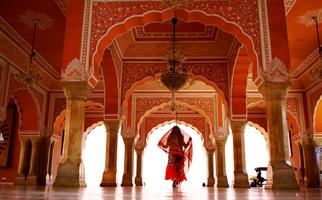
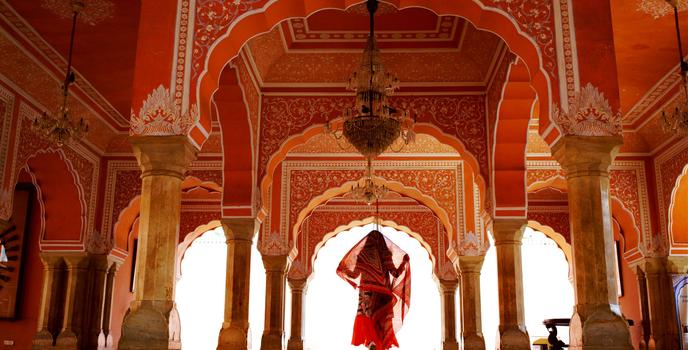
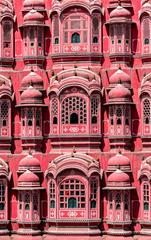
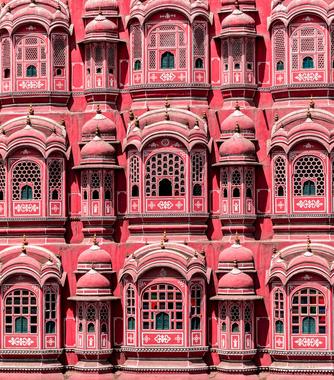
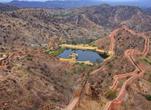
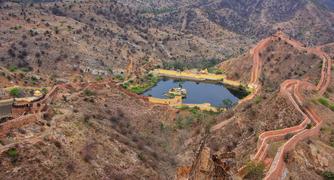
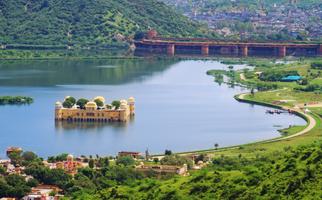
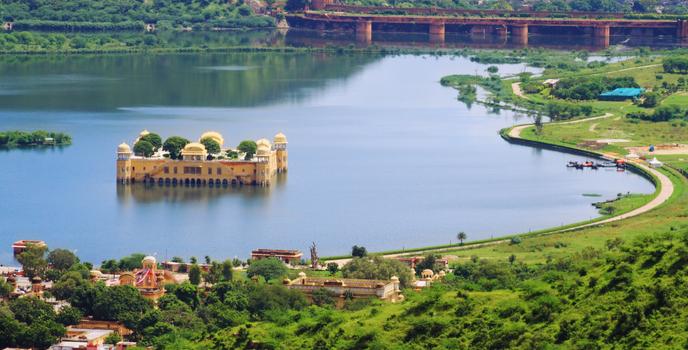
1. Amer Fort: A Rajasthani Gem
Just outside Jaipur, this epic 16th-century fortress perches upon a hilltop. The sprawling palace seems to never end, arranged as it is on four levels with an opulent courtyard on each. Also known as the Amer Fort, its walls glow pink in the sun, a shimmering sight beckoning visitors nearer. A closer look is even more awe-inspiring, with high-quality mosaics and lavish designs taking over the interior. The Mirror Palace is the most beautiful, featuring carved walls and ceilings of pure glass.
2. City Palace: The Pink City
There is nothing quite like vast City Palace - its pastel buildings boast the greatest constellation of cultural styles around, from Mughal to European. More and more majestic homes were added over the centuries so that today visitors step from one era into the next as they let their imaginations run wild. Ogle the royal textiles worn by kings and queens, and take in the display of weaponry from swords to axes. Surprises await around every corner, so explore your heart out.
3. Hawa Mahal: Palace of Winds
This design of the gleaming pink palace is based on the complex crown of Lord Krishna, and its detail is overwhelmingly beautiful. Hundreds of windows make up the facade of the ancient structure, extending skywards in five tiers of ornate perfection. Wives of kings used to look out upon processions below, hidden from the ordinary folk - a division you can experience for yourself today from both perspectives. Every inch is awe-inspiring, with historical lessons along the way.
4. Albert Hall Museum: Gems of Culture
The oldest museum in Rajasthan is found in the midst of Ram Niwas Gardens, the stunning building an architectural wonder in itself. Once inside, visitors are awestruck by the collection of local craftwork on display. Buddhist murals, dwarfing statues, period furniture, and more - the artifacts are utterly unique and culturally priceless. Other thrilling attractions surround this elegant treasure-trove too, and families will love a visit to the adjacent Wonderland Amusement Park or Jaipur Zoo.
5. Jaigarh Fort: Panoramic Views
Opposite the Amer Fort, this expansive complex was built to defend its hallowed predecessor. For nearly two miles these fortified walls stretch along "the Hill of Eagles," and from every lookout point, visitors can see the Amber Palace and the city of Jaipur nestled in the valley below. Rajasthan's landscape is as stunning as the historic monuments found there, and from here you get the best of both worlds. The world's largest cannon is also an incredible sight to behold.








Where to Eat in Jaipur
Finding great food in Jaipur is as easy as stepping onto the street. There are hundreds of excellent street food stalls and cafes all over town like Falahaar and Chawla's. If you want a high-class sit down meal, that's no problem either. Some of the best restaurants in town include Laxmi Mishthan Bhandar, which specializes in vegetarian platters, Surya Mahal at the Oberoi, which showcases Rajasthani cuisine, and the Copper Chimney, a wonderful fusion of Indian and Chinese cooking. Prices vary massively, but a typical meal will cost around ₹150.
When to visit Jaipur
Jaipur's "winter" is probably the best time to visit. Between November and March, the weather is dry and mild, without the searing heat of summer and the impractical downpours and humidity of monsoon season. October can be a good time to find cheaper accommodation, if the high season prices are out of your price range.
How to Get to Jaipur
Plane
Jaipur International Airport (JAI) is the main point of arrival for international travelers, although a transfer in Mumbai or New Delhi may be required for visitors from North America. Taxis are the best way to get into town, and should cost about ₹400.
Train
Jaipur has rail connections with a huge number of Indian cities, all of them provided by Indian Railways. Most of them get into Jaipur Junction station, just to the west of the city center. From there, a taxi shouldn't cost more than ₹200.
Car
Jaipur is about 200 miles southwest of New Delhi, and you can easily reach it by taking Indian Highway 48. If you are staying in Agra, take Highway 21 straight into town.
Bus
Buses are comfortably the cheapest way to travel between Indian cities, but they aren't usually the most comfortable. However, that's not the case with the New Delhi-Jaipur service operated by RSRTC, which has air conditioning and runs to Sindhi Camp Bus Station, very close to the city center.
Airports near Jaipur
Airlines serving Jaipur
Where to stay in Jaipur
The Pink City - Jaipur's old town is known as the "Pink City" due to its delicately colored stone, and it's full of historical attractions. From the City Palace to the Hanumanji Mandir, the center of town is a wonderland of beautiful carvings, restful gardens, and dazzling works of art.
Popular Neighborhoods in Jaipur
Ashok Nagar - just to the southwest of the city center lies Ashok Nagar, an elegant, wealthy neighborhood that acts as Rajasthan's political hub. But it's full of interest for visitors as well, thanks to the huge Albert Hall Museum, the prestigious Raj Mandir Cinema, and the green space of Central Park.
Johari Bazar - located near the center of town, everyone should visit Johari Bazar during their stay. It's probably Jaipur's number one shopping neighborhood, with an endless array of jewelry vendors and sari sellers to explore, and it's full of atmosphere.
Where to stay in popular areas of Jaipur
Most booked hotels in Jaipur
How to Get Around Jaipur
Public Transportation
The cheapest way to get around Jaipur is via RTDC buses, which are provided by the local tourist board. They will take you around the major sights for a reasonable fee of ₹300. However, the Pink City By Night tour is just ₹75 more, and may be worth it for the stunning spectacle of Jaipur's illuminations.
Taxi
Many visitors to Jaipur choose to avoid the buses and take on their own auto-rickshaw driver to get around. If you have ₹350 to spare, you can hire the services of a local expert, get insider tips, and (more or less reliable) information about the sights. Ordinary taxis are another option, and rates start from around ₹12 per mile (though prices vary by company, so check the fare before you travel).
Car
Many of the attractions in Jaipur are outside of town, such as the Amer Fort and the textile workshops in Sanganer, so having your own car can really help. You can rent a vehicle from branches of Savaari and Avis, and rates can be as little as ₹250 per day if you shop around.
The Cost of Living in Jaipur
Shopping Streets
Shopping is a real experience in Jaipur. The best shopping places in the city are the numerous bazaars. Jaipur is probably the number one place in India to shop for jewelry, so dive into Johari or the Gem Palace and find something you love. Textiles are another specialty, try Kishanpol Bazar, or head to Nehru Bazar to find colorful joothis (Indian slippers).
Groceries and Other
The best places in Jaipur to shop for groceries are supermarkets like Reliance Fresh and the Country Store, which stock a variety of Indian foods and western brands. Prices tend to be low, at around ₹160 for a gallon of milk and ₹47 for a pound of apples.
